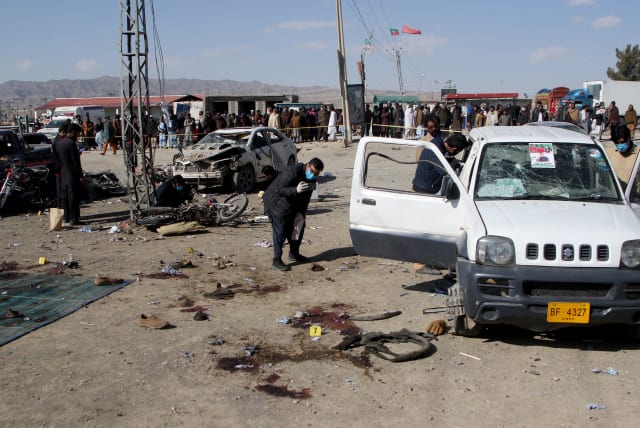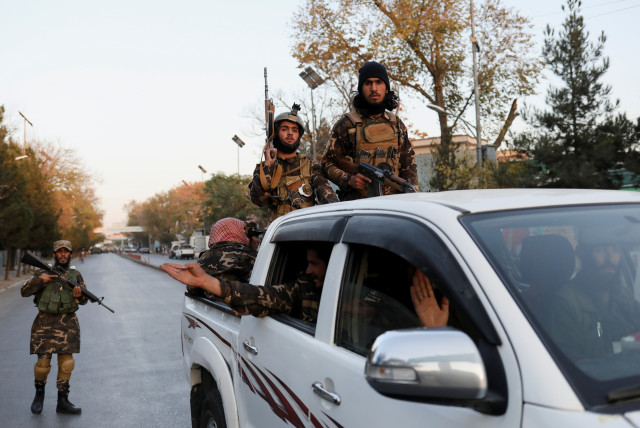‘Solid Indications’ of TTP involvement: Pakistan arrests 11 suspects in bus attack

On March 26, five Chinese engineers and a Pakistani driver were killed when an attacker drove an explosive-laden vehicle into their convoy near Besham City in northwest Pakistan.
Pakistani officials announced on Sunday the arrest of 11 terrorists linked to the suicide attack on a bus carrying Chinese workers in Besham, northern Pakistan, which borders Afghanistan.
On March 26, five Chinese engineers and a Pakistani driver were killed when an attacker drove an explosive-laden vehicle into their convoy near Besham City in northwest Pakistan’s Khyber Pakhtunkhwa province.
The convoy was traveling from Islamabad to Dasu, where China is constructing a key hydroelectric dam.
Previous attack on Chinese workers in Pakistan
This is not the first time Chinese employees have been attacked in this area of Pakistan. In July 2021 at least 12 people, including nine Chinese engineers and two paramilitary personnel, were killed and several others injured in a bus attack near the Dasu hydropower plant.
Dasu Dam is approximately 113 miles north of the capital Islamabad.

The hydropower plant is part of the China-Pakistan Economic Corridor (CPEC), a key project of China’s Belt and Road Initiative. China has pledged over $65 billion for road, rail, and infrastructure projects in Pakistan under CPEC, aiming to enhance regional connectivity and economic growth.
During a joint press conference in Lahore, Muhammad Tahir Rai, the civilian national coordinator of Pakistan’s National Counter-Terrorism Authority, together with Interior Minister Mohsin Naqvi, revealed that “the detained individuals are members of the banned Tehrik-i-Taliban Pakistan [TTP].”
Providing details of the attack, Tahir said, “The vehicle used was manufactured in Afghanistan, transported from Afghanistan, and the suicide bomber was also trained there.”
“A mobile phone found at the attack site, which the bomber used to communicate with local handlers, was pivotal in the investigation,” Tahir explained. “Forensic analysis of the phone led to the arrests. Our investigations and evidence reveal that the terrorists were taking instructions from TTP commanders in Afghanistan.”
“We have solid indications that TTP operatives working from Afghanistan were involved in this attack.” Minister Naqvi charged. “Legal assistance will be requested from Kabul to apprehend three additional key TTP members who directed the attacker and his facilitators from there.”
“We want Afghanistan to take action against these terrorists. They should either be arrested there or handed over to us,” the interior minister said during the press conference, expressing concern about the use of Afghan soil to target Chinese citizens. “These threats originating from across the border are becoming increasingly complex for regional security.”
Naqvi added that “Islamabad is aware of the forces behind such attacks, aiming to disrupt Pakistan’s relations with China. They are exploiting the weaknesses of Afghanistan’s interim government.”
Another Islamabad-based senior official, speaking on condition of anonymity, told The Media Line that “immediately after the incident, a Joint Investigation Team, including Chinese intelligence officials, was formed to investigate the occurrence.”
“Four men were initially arrested based on the investigation, while other suspects, including the facilitator, were apprehended later,” he added. The official also stated that the investigation revealed a lack of coordination between law enforcement agencies at security checkpoints, contributing to the attack.
He added that “during the interrogation, links with Indian intelligence were also disclosed by the terrorists.” However, due to the sensitivity of the matter, the official declined to share further details.
Prime Minister Shahbaz Sharif ordered strict disciplinary action against five senior police officers for negligence in security.
The Pakistan Army had issued a parallel report on the suicide bombing. At a news conference in Islamabad, the armed forces spokesman Maj. Gen. Ahmad Sharif stated that “the attack was an attempt to harm the friendship between Pakistan and China.”
The military spokesman further said, “Thousands of Chinese nationals are currently working on projects related to the China-Pakistan Economic Corridor, which has become a significant target for armed groups seeking to disrupt the strategic partnership between the two countries.”
As of this writing, Afghanistan has not issued an official response to Pakistan’s allegations.
Meanwhile, the federal government has decided to implement a “safe city” project in Dasu and Chilas to provide robust security to Chinese nationals. A press release from the Interior Ministry said that Interior Minister Mohsin Naqvi had chaired a meeting “to review security matters in the area and formed a special committee to develop a comprehensive plan for these projects within the next 15 days.”
Naqvi, as quoted by his ministry, emphasized, “The objective of the ‘safe city’ initiative extends beyond mere camera installation; it entails a technologically advanced system integrated with artificial intelligence tools. This project will ensure comprehensive surveillance and security coverage of the area.”
The situation on the Pakistan-Afghanistan border traces its roots to developments in 2001. Pakistan, under General Musharraf’s leadership, provided logistical support to the United States and its allies in Afghanistan as they attempted to locate and punish the perpetrators of 9/11. This support by the Pakistani government led to a war against coalition forces by Pakistani tribal fighters and supporters of Osama bin Laden, in turn sparking terrorist activities within Pakistan.
In 2007, these factions coalesced under the banner of Tehrik-i-Taliban Pakistan (TTP), led by the notorious jihadist commander Mullah Fazlullah, who introduced suicide attacks into the region’s culture. Over the years, terrorism and suicide attacks claimed over 70,000 Pakistani lives.
The TTP aims to overthrow the Pakistani government and establish an Islamic state governed by its hard-line interpretation of Sharia law. Responsible for numerous high-profile attacks, including the 2014 Peshawar school massacre, the TTP targets military, civilian infrastructure, and foreign nationals, destabilizing the region.
Despite operations by the Pakistan Army, many TTP gunmen sought refuge in Afghanistan, joined forces with the Afghan Taliban, and continued to fight the US-led allied forces. This cross-border alliance continues to complicate counter-terrorism efforts, making the TTP a significant player in regional geopolitics.
Since the withdrawal of US-led coalition forces from Afghanistan, the Pakistan Army remains engaged in fighting terrorists along a porous border 1,600 miles long, while terrorist groups from Afghanistan continue to target Pakistani security forces and flee back across the border.
Waleed Parwez commented to The Media Line from his position as a director at the Pakistan Strategic Forum, an Islamabad-based think tank focused on defense, national security policy, and weapons intelligence. “The goal of these groups is the same as any terrorist outfit: to create and spread terror under the guise of an ideological armed effort, aiming to further their own political goals or those of their benefactors and sponsors, whether supported by state or non-state actors.”
“In the case of the TTP,” he added, “they have multiple state and non-state actors sponsoring their activities. The Afghan Taliban, for instance, harbor and provide safe havens, recruitment pools, and weapons to the TTP. They view the TTP as a counter-balancing force against the Pakistani government’s superior military strength and thus as a strategic weapon in that regard.”
Parwez claimed also that “certain hostile intelligence agencies (HIAs), particularly Indian intelligence, provide state-level sponsorship to these groups to keep Pakistan’s western borders perpetually destabilized.”
Adeeb UZ Zaman Safvi, a Karachi-based defense and strategic analyst, told The Media Line, “Pakistan has repeatedly approached the Afghan Taliban with concrete evidence against the TTP, but the Afghan government has failed to show any clear action in this regard.”
He further said, “It is a reality that Afghan Taliban and TTP share the same ideology. The TTP fighters fought hard alongside the Afghan Taliban during the US-led invasion, therefore the Afghan authorities seem reluctant to take action against them.”
Safvi also noted, “Another reason for not taking action against the Pakistani Taliban is that the Afghan Taliban do not have complete authority in the country. They have entirely failed to establish a politically inclusive government having ethnically balanced representation.”
In a recent written response to the National Assembly, Pakistan’s Interior Ministry highlighted enhanced security measures for Chinese and domestic citizens working on CPEC and other projects.
The response noted that most terrorist attacks since 2020 targeted Chinese nationals but didn’t specify the number of foreigners killed. In general, the government is concerned about escalating security threats in Khyber Pakhtunkhwa and Balochistan, where over 2,000 terrorist attacks have been reported since 2023.
The ministry emphasized that a national anti-violent extremism policy to address terrorism is pending cabinet approval.
